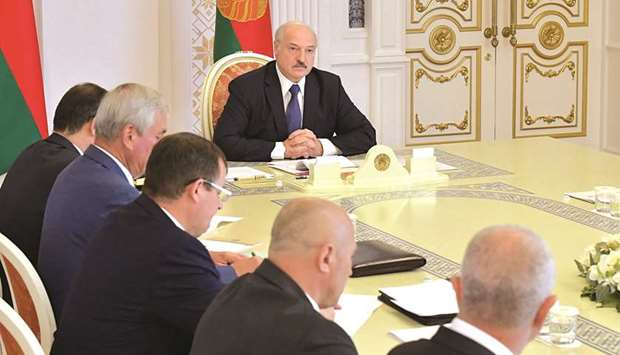The nascent political opposition in Belarus established a council inside the country yesterday, a move President Alexander Lukashenko denounced as an attempt to seize power 10 days after an election that has triggered mass demonstrations.
Many of Belarus’s major opposition figures are either in jail or in exile, including presidential candidate Sviatlana Tsikhanouskaya, who fled the country after the vote her supporters say she won.
Olga Kovalkova, representing Tsikhanouskaya at a press conference to launch the new opposition council, said she expected Tsikhanouskaya would soon return to Minsk, to act as a guarantor in a negotiated transition of power.
“We are operating solely through legal means,” Kovalkova said. “The situation is critical. The authorities have no choice but to come to dialogue. The situation will only get worse.”
Earlier, in televised remarks to his Security Council of top brass, Lukashenko described the opposition council as “an attempt to seize power” and promised to take “appropriate measures” to halt it. Since official results declared him the election winner with 80% of the vote, Lukashenko seems to have underestimated the strength of public anger in a country suffering economic hardship and a coronavirus epidemic that he has dismissed.
There have been increasing signs that the former Soviet collective farm boss is losing his grip on the country he has ruled for 26 years, with workers going on strike at state factories long seen as bastions of his support. After videos appeared on the Internet showing some police officers throwing their uniforms into dustbins, the Interior Ministry acknowledged yesterday that some police had quit. It issued a plea for others to stay at their post.
“We will not judge the small proportion of police officers who have today left the service out of personal convictions,” the Interior Ministry press office said in a statement.
It said the protesters were a minority, and most Belarusians wanted to live in peace: “If the entire police force today takes off its badges, who will protect those Belarusians while the other part takes to the street to give its opinions?”
Earlier yesterday, Lukashenko awarded medals “for impeccable service” to law enforcement officials who have helped him crack down on protesters. At least three protesters have been killed and thousands detained in the crackdown that followed the election.
Tsikhanouskaya, a 37-year-old political novice who emerged as an unexpected consensus opposition candidate after better-known figures including her activist husband were jailed or barred from standing in the election, has issued calls via the internet to followers to rise up, but remain peaceful.
Hundreds of protesters chanting “shame” gathered at a theatre in Minsk yesterday in solidarity with its director, who was fired for speaking out in support of the opposition. They were due later to converge on a prison where Tsikhanouskaya’s husband has been detained.
“All of this outrageous, unfair lawlessness shows us how this rotten system works, where one person controls everything,” Tsikhanouskaya said in a video. “One man has kept the country in fear for 26 years.”
For his part, Lukashenko says the protests are being stirred up from abroad. Lukashenko told his Security Council that the army had gone on full alert at the western borders, describing “internal problems” as part of an external threat.
Attention is firmly focused on how Russia will respond to the biggest political crisis facing an ex-Soviet neighbour since 2014 in Ukraine, when Moscow intervened militarily after a friendly leader was toppled by public protests.
Of all former Soviet republics, Belarus is closest to Russia culturally, politically and economically, with a treaty that proclaims the two countries part of a “union state” with a Soviet-style red flag. But Russian President Vladimir Putin and Lukashenko have had a difficult personal relationship.
The European Union is gearing up to impose new sanctions on Belarus officials. European officials say the situation in Belarus is different from Ukraine’s six years ago, in part because the Belarus opposition is not necessarily seeking to loosen ties with Russia, merely to get rid of Lukashenko.
German Chancellor Angela Merkel, French President Emmanuel Macron and EU foreign policy chief Charles Michel spoke to Putin by telephone yesterday. The Kremlin said Putin warned all three against foreign meddling in the affairs of Belarus.

Belarusian President Alexander Lukashenko chairs a meeting with members of the Security Council in Minsk, Belarus, yesterday.
